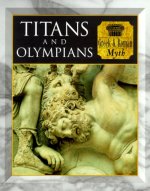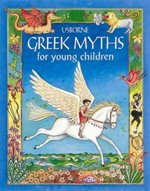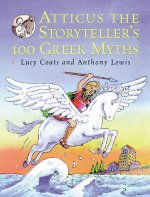Menu
Install the app
How to install the app on iOS
Follow along with the video below to see how to install our site as a web app on your home screen.
Note: This feature may not be available in some browsers.
You are using an out of date browser. It may not display this or other websites correctly.
You should upgrade or use an alternative browser.
You should upgrade or use an alternative browser.
Greek Mythology Community
What are the best Greek mythology books for teens?
- Thread starter nadellii
- Start date
1 - 6 of 6 Posts
J
John Stefan
Guest
Yes I do. Below are 3 good Greek Mythology Books to recommend for teenagers.
1 - Atticus The Storyteller 100 Greek Myths
2 - Usborne Greek Myths for Young Children
3 - Titans and Olympians Greek and Roman Mythology Myth and Mankind
I hope this helps as they are all very good books in my opinion so any or all of them will do.
kind regards John Stefan
1 - Atticus The Storyteller 100 Greek Myths
2 - Usborne Greek Myths for Young Children
3 - Titans and Olympians Greek and Roman Mythology Myth and Mankind
I hope this helps as they are all very good books in my opinion so any or all of them will do.
kind regards John Stefan
kosta_karapinotis
Active member
I love the Percy Jackson series! It's inspired by Greek mythology, not actual Greek mythology
J
John Stefan
Guest
knicks_fan87
Active member
I used to have Greek Myths for Young Children! You're bringing back so many memoriesBelow are the pictures of the 3 books that I recommended
kind regards John Stefan
k_tsoukalas
Administrator
I read the Edith Hamilton one when I was in middle school. I think I was a bit too young, but high school age might be about right for that one.

 en.wikipedia.org
en.wikipedia.org

Mythology (book) - Wikipedia
1 - 6 of 6 Posts
JOIN THE DISCUSSION AND READ OTHER GREEK INFO:
Mythological Roots of the Olympic Games
- dimi_pat
- Greek Mythology Forum
- Replies: 1
I've recently found myself deeply fascinated with how ancient myths and legends have influenced modern traditions and events, particularly those with a global following. Among these, the Olympic Games stand out as a prime example of ancient traditions influencing contemporary world culture. I'm eager to learn more about the mythological roots of the Olympic Games and thought this would be the perfect community to turn to for insights.
From what I understand, the origins of the Olympics are deeply intertwined with Greek mythology. The games were held in Olympia, a sanctuary site for Greek gods, and featured various competitions and rituals dedicated to Zeus, the sky and thunder god in ancient Greek religion. However, my knowledge of how these mythological aspects directly influenced the establishment and evolution of the Olympic Games feels quite superficial.
From what I understand, the origins of the Olympics are deeply intertwined with Greek mythology. The games were held in Olympia, a sanctuary site for Greek gods, and featured various competitions and rituals dedicated to Zeus, the sky and thunder god in ancient Greek religion. However, my knowledge of how these mythological aspects directly influenced the establishment and evolution of the Olympic Games feels quite superficial.
12 Olympian Gods and Goddesses
- ssherie_
- Greek Mythology Forum
- Replies: 1
I love mythology and I thought I'd make list of the 12 Olympian Gods and Goddesses. This is my best guess. Do you know that I have seen different versions of this? What do you think?

- Zeus: The king of the gods, ruler of the sky and thunder, and the god of law, order, and justice.
- Hera: The queen of the gods, Zeus's wife and sister, and the goddess of marriage and childbirth.
- Poseidon: The god of the sea, earthquakes, and horses, often depicted with a trident.
- Demeter: The goddess of agriculture, fertility, and the harvest, responsible for the cycle of life and death in crops.
- Athena: The goddess of wisdom, warfare, strategy, and crafts, often associated with strategic warfare and civilization.
- Apollo: The god of music, poetry, prophecy, healing, and archery, known for his wisdom and beauty.
- Artemis: The goddess of the hunt, wilderness, childbirth, and virginity, often depicted with a bow and arrows.
- Ares: The god of war, violence, and bloodshed, embodying the brutal aspects of conflict.
- Aphrodite: The goddess of love, beauty, pleasure, and procreation, born from the sea foam and known for her irresistible charm.
- Hephaestus: The god of fire, blacksmiths, craftsmen, and volcanoes, renowned for his skill in metalworking.
- Hermes: The messenger of the gods, associated with travel, commerce, communication, and trickery.
- Dionysus: The god of wine, fertility, ecstasy, and theatre, representing the joyous aspects of life and celebration.

Learning About Dionysius
- redsoxdw_
- Greek Mythology Forum
- Replies: 1
I have recently been studying about Dionysius. I feel like I hav been forgetting about him! Beyond the basics that he is the Greek god of wine, festivity, and ecstatic celebration, I’m eager to peel back the layers and understand his role and significance across different cultures and historical epochs.
What piqued my interest initially was how Dionysius seems to embody a dual nature – both bringing joy and chaos. This duality, along with his followers, rituals, and the influence on arts and culture, presents a fascinating study. I am particularly interested in the Dionysian festivals!
Curious to hear people's thoughts...
What piqued my interest initially was how Dionysius seems to embody a dual nature – both bringing joy and chaos. This duality, along with his followers, rituals, and the influence on arts and culture, presents a fascinating study. I am particularly interested in the Dionysian festivals!
Curious to hear people's thoughts...
Thesmorphia - Ancient Greek Thanksgiving Festival
- cubrinj
- Greek Mythology Forum
- Replies: 1
I have heard this festival described as an "Ancient Greek Thanksgiving" so I thought I would look it up. Very interesting! I don't see the "Thanksgiving" connection (not the way we in the US think of it) but I thought it was interesting because it goes to show you that gratitude-related festivals are an ancient concept. And it is a harvest festival, just like our US Thanksgiving is...
Some information I have gathered:
The Thesmorphia festival was celebrated on the 11th of Pyanepsion, which corresponds to late October or early November in the modern Gregorian calendar. The festival was a three-day affair, and it was observed mainly by women. During the festival, women were not allowed to sleep with their husbands, and purification rituals were performed at the temples of Demeter and Persephone. On the first day, the first fruits of the harvest were offered to Demeter, and a feast was held in her honor. On the second day, a procession was held, and women walked around the fields carrying torches, symbolizing the power of Demeter. The third day was a joyous celebration, and the remnants of the feast were donated to the poor.
The Thesmorphia festival was significant for many reasons. Firstly, it celebrated the end of the harvesting season, and it was a time to give thanks for a good crop. The festival was also a time for women to come together, and it was an opportunity for them to assert their power and influence in the society. Women played a significant role in the festival, and they were responsible for the preparation of the feast and various other aspects of the festival.
The festival was also significant in terms of its religious and mythological significance. Demeter was the goddess of agriculture, and Persephone was her young daughter, who was kidnapped by Hades, the god of the underworld. The story of Persephone reflects the cycle of life, death, and resurrection. The festival of Thesmorphia was an opportunity to honor these two goddesses and their mythology, which highlighted the importance of the harvest and the cycle of life.
Another reason why the Thesmorphia festival was significant was that it was a time for the community to come together and celebrate. The feast was an opportunity to share food, drink, and stories and build camaraderie amongst members of the community. During the festival, people forgot their differences and came together to celebrate the bounty of the harvest.
Some information I have gathered:
The Thesmorphia festival was celebrated on the 11th of Pyanepsion, which corresponds to late October or early November in the modern Gregorian calendar. The festival was a three-day affair, and it was observed mainly by women. During the festival, women were not allowed to sleep with their husbands, and purification rituals were performed at the temples of Demeter and Persephone. On the first day, the first fruits of the harvest were offered to Demeter, and a feast was held in her honor. On the second day, a procession was held, and women walked around the fields carrying torches, symbolizing the power of Demeter. The third day was a joyous celebration, and the remnants of the feast were donated to the poor.
The Thesmorphia festival was significant for many reasons. Firstly, it celebrated the end of the harvesting season, and it was a time to give thanks for a good crop. The festival was also a time for women to come together, and it was an opportunity for them to assert their power and influence in the society. Women played a significant role in the festival, and they were responsible for the preparation of the feast and various other aspects of the festival.
The festival was also significant in terms of its religious and mythological significance. Demeter was the goddess of agriculture, and Persephone was her young daughter, who was kidnapped by Hades, the god of the underworld. The story of Persephone reflects the cycle of life, death, and resurrection. The festival of Thesmorphia was an opportunity to honor these two goddesses and their mythology, which highlighted the importance of the harvest and the cycle of life.
Another reason why the Thesmorphia festival was significant was that it was a time for the community to come together and celebrate. The feast was an opportunity to share food, drink, and stories and build camaraderie amongst members of the community. During the festival, people forgot their differences and came together to celebrate the bounty of the harvest.
About My Favorite Greek Goddess Aphrodite
- paharo45
- Greek Mythology Forum
- Replies: 1
I have been researching Aphrodite, one of my favorite goddesses. I put this together based on my research.
Aphrodite was the goddess of love, beauty, and sexuality. She was regarded as the most beautiful and desired goddess in all of Greek mythology. (I think that might be why she fascinates me!)
Aphrodite's origin story is interesting. It's said that she was born from the sea foam created when the Titan Cronus cut off the genitals of his father Ouranos. She was the goddess of love, beauty, and sexuality, with her appearance at times described as pure beauty itself. She is often depicted with a flowing garment that barely covers her curves, and barefooted standing on a pedestal, highlighting her goddess-like beauty.
According to Greek legends, Aphrodite fell in love with many gods, mortals, and even animals, which often resulted in chaotic and tragic events. It is said that she helped cause the Trojan War by causing the love triangle between Paris, the Prince of Troy, and Helen, who was the wife of the Menelaus of Sparta. The story proved her power's influence and the chaos that follows her love.
Aphrodite was also a patron of love and marriage, and apparently married to the god Hephaestus, who fell in love with her beauty alongside all the Greek gods. This marriage was a politically motivated decision of Hera, whose husband Zeus had numerous affairs and that caused constant jealousy between their married life. Needless to say, Aphrodite was having none of it, with her notable lovers being Ares, Adonis, and Anchises.
Aphrodite's influence can be seen even today with countless works of art inspired by her beauty. That is why I love lear about her. She seemed to embody the feminine spirit.

Aphrodite was the goddess of love, beauty, and sexuality. She was regarded as the most beautiful and desired goddess in all of Greek mythology. (I think that might be why she fascinates me!)
Aphrodite's origin story is interesting. It's said that she was born from the sea foam created when the Titan Cronus cut off the genitals of his father Ouranos. She was the goddess of love, beauty, and sexuality, with her appearance at times described as pure beauty itself. She is often depicted with a flowing garment that barely covers her curves, and barefooted standing on a pedestal, highlighting her goddess-like beauty.
According to Greek legends, Aphrodite fell in love with many gods, mortals, and even animals, which often resulted in chaotic and tragic events. It is said that she helped cause the Trojan War by causing the love triangle between Paris, the Prince of Troy, and Helen, who was the wife of the Menelaus of Sparta. The story proved her power's influence and the chaos that follows her love.
Aphrodite was also a patron of love and marriage, and apparently married to the god Hephaestus, who fell in love with her beauty alongside all the Greek gods. This marriage was a politically motivated decision of Hera, whose husband Zeus had numerous affairs and that caused constant jealousy between their married life. Needless to say, Aphrodite was having none of it, with her notable lovers being Ares, Adonis, and Anchises.
Aphrodite's influence can be seen even today with countless works of art inspired by her beauty. That is why I love lear about her. She seemed to embody the feminine spirit.

Share and discuss Greek mythology!
WorldwideGreeks.com is a free online forum community where people can discuss Greek food, travel, traditions, history and mythology.
Join Worldwide Greeks here!
Join Worldwide Greeks here!
JOIN COMMUNITY FOR FREE
LOGIN TO YOUR ACCOUNT





